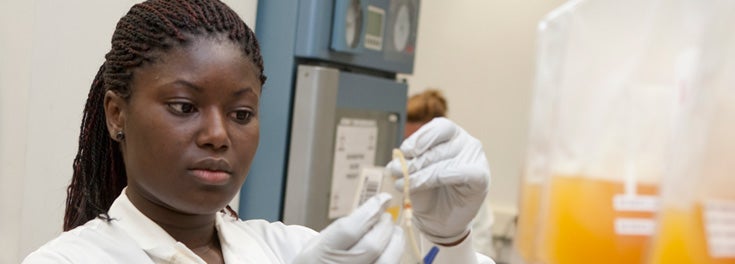
The biggest challenge of Jessica Adefusika’s college career was deciding which medical school to attend – from among the six that wanted her. She chose the world-renowned Mayo Medical School in Minnesota, where she’s now finishing up her medical degree. And she credits URI for launching her medical career. “I’m proud to say that my experiences at URI got me where I am today.”
Some of the 19 URI students who applied to med school last year majored in pharmacy, engineering, philosophy, French and medical laboratory science.
At URI, Jessica ’10, isn’t the exception; she’s the rule. While just 45 percent of medical school applicants nationwide (and 44 percent of dental school applicants) are accepted, 90 percent of URI applicants were accepted last year, which is only slightly higher than our ten-year average.
This tremendous success is partly attributed to HPAC – our health professions advisory committee – which guides prospective medical students through the application process, conducts mock interviews, strategizes on approaches to admissions tests, and provides a letter of endorsement for each eligible candidate.
“We make sure our students apply when they are most ready to be successful, which isn’t always in their junior or senior year,” said Kathleen Maher, chair of HPAC and assistant director of the URI Honors Program. “And we encourage students to get a broad-based undergraduate education. Beyond an aptitude for the sciences, med schools in particular want students who have learned to be critical thinkers and have really explored what it means to be human.”
So don’t think you have to major in biological sciences or biochemistry to get into medical school. Some of the 19 URI students endorsed by HPAC last year majored in pharmacy, engineering, philosophy, French and medical laboratory science. And they were accepted to highly prestigious medical schools, including those at Brown, Northwestern, Vanderbilt, Tufts, Mayo, Tulane, Ohio State and Wake Forest. Two of last year’s applicants were even accepted into MD/PhD programs with full funding to become physician scientists, the most competitive (and longest) route to a medical degree.
“If a student comes here and performs well academically and follows our advice for extracurricular activities, chances are they’re going to be a strong candidate for medical school,” said Maher.
That’s what Shayla Minteer did. A junior studying business and medical lab science, she has a passion for helping other people, both in her daily life and her career. “My goals are to love others and preserve life. I can accomplish those goals as a doctor,” she said. She’s already on her way. As a sophomore, she was accepted to Brown University’s highly competitive Warren Alpert School of Medicine through the URI-Brown Early Identification Program.
Fact is, if medical school is in your future plans, URI might be a great place to get started.
Pictured: Jessica Adefusika ’10 interning at the Rhode Island Blood Bank while a student at URI
